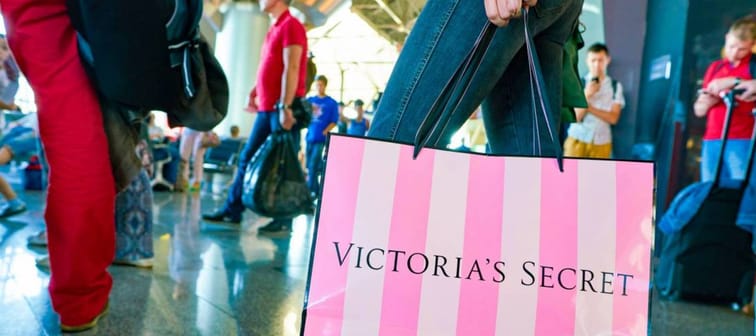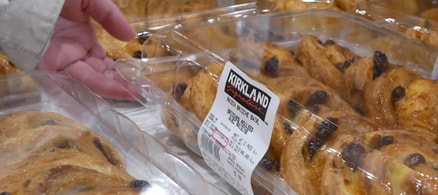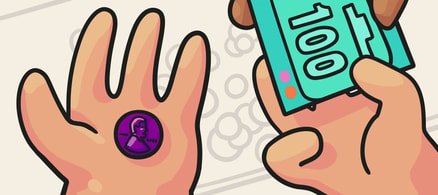1. Diet Pepsi

Diet Pepsi was super popular in the ‘90s
Diet Pepsi was super popular in the 1990s, but sales have fallen drastically in recent years.
While diet sodas first came onto the market in response to worries about sugary sodas, today there’s concern about the potential harms of ingesting artificial sweeteners and aspartame.
Instead of Diet Pepsi, millennials prefer healthier drinks like sparkling water.
Meet Your Retirement Goals Effortlessly
The road to retirement may seem long, but with WiserAdvisor, you can find a trusted partner to guide you every step of the way
WiserAdvisor matches you with vetted financial advisors that offer personalized advice to help you to make the right choices, invest wisely, and secure the retirement you've always dreamed of. Start planning early, and get your retirement mapped out today.
Get Started2. Victoria's Secret

People aren't filling up shopping bags at Victoria's Secret the way they used to.
Victoria's Secret — the lingerie brand known for its fashion shows and skimpy styles — is looking a little ragged these days.
Analysts say with its in-your-face sexuality, dark stores, glam image and reliance on skinny models, Victoria's Secret has lost relevance with today's consumers.
Victoria’s Secret closed nearly 250 stores in 2020, and more recently, sales in the third quarter of 2022 fell by 9%.
3. Campbell's Soup

Campbell's soup doesn’t appeal to health-conscious shoppers
Campbell's Soup is now more likely to appear on a graphic T-shirt than on the dinner table. U.S. consumers ages 18 to 34 are just no longer interested in the brand that once dominated the kitchen.
The high amounts of sodium in many canned soups don't appeal to health-conscious shoppers, so sales have been flat since 2012. Campbell’s is now focusing on its organic soups and broths, as well as its portable snacks — but even the organic stuff isn’t selling well.
And, look, if you're still having chicken noodle every day because your student loans are crushing your budget, you should know there are better ways out.
Kiss Your Credit Card Debt Goodbye
Having a single loan to pay off makes it easier to manage your payments, and you can often get a better interest rate than what you might be paying on credit cards and car loans.
Fiona is an online marketplace offering personalized loan options based on your unique financial situation.
When you consolidate your debt with a personal loan, you can roll your payments into one monthly installment. Find a lower interest rate and pay down your debt faster today.
Get Started4. Kodak

Kodak declared bankruptcy in 2012
"Kodak moments" have moved to smartphones and Instagram — and the company once known for its cameras and film hasn't been able to bounce back since declaring bankruptcy in 2012.
Kodak used to be a cutting-edge company that employed around 145,000 people. By 2018, it was desperately dabbling in cryptocurrency.
It introduced "KodakCoin," described as a way for photographers to take control of managing the rights to their images. Although it was creative, this effort was quickly shelved.
5. Harley Davidson

Motorcycle ridership is expected to continue falling
Even Harley Davidson motorcycles are falling victim to the changing shopping and transportation habits of younger consumers.
With so many millennials choosing to use ride-hailing apps and public transportation over personal vehicles, Harley Davidson motorcycles could become a luxury item of the past.
Global asset management firm Alliance Bernstein predicts motorcycle ridership will continue to fall over the next five years.
6. Jell-O

Jell-O may be iconic, but it's one of those products you're almost surprised to see in the supermarket. Really? They still make that?
It's associated with childhood, cafeteria food and the molded dessert rings that Grandma always had on her holiday buffet. Morningstar analyst Erin Lash tells Food Dive Jell-O has had trouble responding to current food trends of health, wellness and convenience.
Jell-O's owner, Kraft Heinz, is trying hard to win over younger consumers. It recently introduced Jell-O Play edible slime, described as a toy you can eat.
7. Gap

A long time ago, there was a jingle that invited consumers to "Fall into The Gap." But lately, shoppers have had more of a falling out with the clothing retailer.
The brand is so troubled that parent company Gap Inc. — which also owns the Banana Republic, Old Navy and Athleta chains — is considering closing hundreds of its namesake stores.
Gap's image is "lackluster" and its clothes are "samey and boring," explains Neil Saunders, managing director at the research and consulting firm GlobalData Retail.
8. Chevrolet Volt

General Motors has pulled the plug on its Chevrolet Volt electric car and its similar gas-powered Cruze small sedan. The company announced it would stop making them in March 2019, so their days on the road are numbered.
Sales of those passenger cars have been going downhill, because American consumers would much rather get behind the wheel of SUVs, pickup trucks and crossover vehicles. GM also killed off its Chevy Impala full-size car.
More: Is a Tesla worth buying?
9. Chef Boyardee

There really was a Chef Boyardee, though his family spelled it "Boiardi." He founded his company in Cleveland in 1928, and moms have been relying on its canned pastas for generations.
But Chef Boyardee has been falling out of favor in today's era of fresher, healthier foods. In 2014, the brand was blamed for lackluster earnings at its corporate parent, ConAgra Foods.
More recently, the company now known as Conagra Foods has been trying to update Chef Boyardee with higher-quality ingredients. The move has meant higher prices, too, but executives say the results are showing promise.
10. Twitter

Noone wants to buy Twitter
Since Twitter was founded in 2006, other social media platforms like Snapchat, Instagram and TikTok have been dipping into its user base.
Twitter put itself up for sale in 2016 — but it wasn't until 2022 did it find a buyer in Tesla founder Elon Musk.
Since Musk's takeover, the social media platform has continued to make headlines, and they aren't all great ones.
11. Tiffany

Tiffany is losing its sparkle
If Tiffany’s extended sales slump is any indication, the nearly 200-year-old jewelry brand is facing an uphill battle. American millennials have simply lost interest in the company’s signature rings, bracelets and accessories.
Social changes aren’t helping Tiffany & Co. either, as some couples are now avoiding splurging on diamond engagement rings — or getting married at all — before they move in together and buy a home.
The brand hired Reed Krakoff, the designer responsible for the success of luxury brand Coach, as its chief artistic director to overhaul Tiffany designs to attract younger shoppers. But the company's stock has recently been down 20%.
12. Fiat

The Fiat brand is disappearing in the U.S.
Although it remains wildly popular in Italy, the Fiat brand is disappearing in the U.S.
Fiat's small cars have gained a reputation for being unreliable, and for giving a "choppy" ride. Sales have reportedly been declining month-over-month for years.
U.S. consumers are more interested in SUVs — and Fiat Chrysler has been retooling factories to build more of the light trucks and crossovers Americans want.
13. SlimFast

SlimFast, the maker of diet shakes and drink mixes, is no longer the heavyweight it once was.
The company was recently sold in a deal valued at $350 million — a far cry from the $2.4 billion that consumer products giant Unilever paid for the brand in 2000.
SlimFast has been attempting to boost sales by adding new products like cookies and protein bars, but consumers trying to lose weight are seeking out fresher foods that are lower in carbs.
14. Kenmore

Sears is going down the tubes, and the department store chain is taking its once highly regarded Kenmore appliance brand down with it.
Appliance makers used to put the Kenmore nameplate on some of their best products, but not anymore. As a result, the line is no longer competitive.
Kenmore has become "the equivalent of a flip phone in the smartphone era," Sean Maharaj, director in the retail practice at consulting firm AArete, told CNN. Sears has tried to sell off the brand, but without success.
15. Wheaties

Wheaties, the one-time breakfast of champions
"Eat your Wheaties," is a thing of the past: General Mills' classic breakfast of champions isn't selling like it used to.
Apparently, younger consumers are less likely to buy cereal because they find it too difficult to eat on the go.
Time-conscious millennials prefer faster options for the morning meal, such as breakfast burritos, egg sandwiches and smoothies.
16. Odwalla

Swig down your smoothies while you can. Coca Cola announced plans in July to shut down its juice and smoothie brand Odwalla by the end of the month.
Although the brand was marketed toward health-conscious consumers eager for fresh fruit and vegetables, the beverages drew criticism for their high sugar content. Some bottles had as much sugar as a can of soda or a candy bar.
People are less keen to drink their calories now, and Odwalla wasn’t able to survive the shift.
17. Kraft Singles

American cheese no longer holds the same plasticky appeal that it used to.
Yes, those lurid orange slices that melt gloriously in your grilled cheese sandwiches are increasingly being passed over in favor of “real” cheese, even if it’s less convenient.
Sales of processed “cheese food” are expected to decline rapidly in the coming years, though the market research firm Euromonitor International expects Kraft Singles to endure better than most.
18. Forever 21

Fast fashion is no longer trending among millennials and Gen Z, who are becoming more mindful of their shopping habits.
Forever 21 filed for bankruptcy in 2019. A team of three buyers are hoping to preserve the U.S. stores that remain and expand the brand internationally, but a revival would take a big rethink.
The company lost relevance as its target demographic started paying more attention to sustainable business practices and buying more vintage clothes at thrift stores. That’s not to mention those tacky taco sweatshirts, which will forever haunt us all.
19. Kellogg’s cereals

While Eggo waffles are enjoying a resurgence thanks to Stranger Things, the rest of Kellogg’s breakfast lineup is waning. In February, the company lowered its expectations for 2020 as cereal sales continued to slide.
Americans are turning toward on-the-go foods for their commute to work or school and aren’t as thrilled by the super-sweet cereals of their childhood, like Corn Flakes and Froot Loops. Even “diet friendly” option Special K isn’t selling like it once did.
While Kellogg’s the company isn’t going anywhere — its snack sales have remained strong — a few members of the breakfast crew could vanish sooner than you think.
20. Applebee’s

The Neighborhood Bar & Grill is fading out, and the pandemic can’t take all the blame.
Younger generations prefer fast-casual restaurants like Chipotle or ordering delivery over sit-down dining at chains. Applebee’s mainstream American dishes aren’t helping its cause either, when healthier and more creative options exist.
As a result, Applebee’s has closed more than 200 locations since 2016.
More: America's favorite sit-down restaurants
21. Claire’s

Those cheap and colorful earring multipacks — we will never forget the spiky neon ball studs — have apparently lost their charm for younger folks today.
Claire’s filed for bankruptcy in 2018, blaming its slow earnings on reduced foot traffic in malls.
The teen jewelry brand's free piercing service is unique but doesn’t translate online, and the buy-one-get-one sales and sparkly hair accessories aren’t enough to tempt shoppers to return.
22. H&M

While this brand is faring better than competitor Forever 21, H&M isn’t immune to the downfall of fast fashion.
The company was shuttering its stores even before the pandemic began and is struggling to get rid of billions in unsold inventory clogging its shelves.
All of that mess and surprisingly high prices have made it even more difficult to compete with more sustainable brands.
23. Ann Taylor and her sister stores

Multiple news outlets report that Ascena, parent company of familiar women’s brands such as Ann Taylor and Loft, is near bankruptcy and may end up closing around a third of its stores.
Bloomberg says the retailer might even jettison the tween brand Justice and plus-size staple Catherines.
Ascena already sold off Maurices and pulled the plug on Dressbarn in 2019, so we wouldn’t be surprised if more of its stores followed.
Sponsored
Follow These Steps if you Want to Retire Early
Secure your financial future with a tailored plan to maximize investments, navigate taxes, and retire comfortably.
Zoe Financial is an online platform that can match you with a network of vetted fiduciary advisors who are evaluated based on their credentials, education, experience, and pricing. The best part? - there is no fee to find an advisor.







